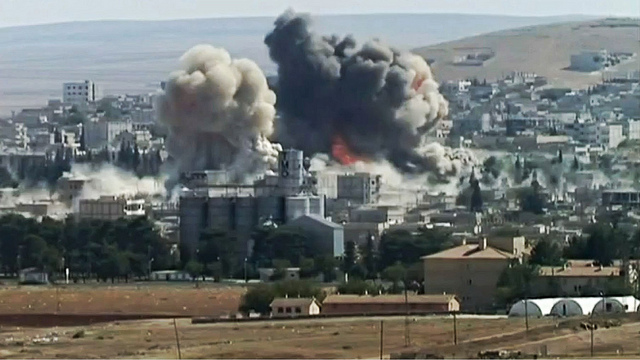 Explosions seen in Kobane, Syria. Sunnis and Shias have been fighting in Syria since 2011; the conflict has claimed the lives of more than 200,000 people (photo credit: Flickr, Karl-Ludwig Poggemann).
Explosions seen in Kobane, Syria. Sunnis and Shias have been fighting in Syria since 2011; the conflict has claimed the lives of more than 200,000 people (photo credit: Flickr, Karl-Ludwig Poggemann). American politicians often claim that if the Arab-Israeli conflict were to be solved, then the myriad of problems in the Middle East would be replaced by peace in the volatile region. George J. Mitchell, a former US Senator and former US special envoy to the Middle East, claims that achieving peace between the Israelis and the Palestinian Arabs would stabilize the entire region and would “deprive the extremists of the chaos in which they thrive.” Former US President Jimmy Carter has said that “without doubt, the path to peace in the Middle East goes through Jerusalem.” Those that assert these claims are not only naive, but are also ignoring the complexity of the issues that have long affected Israel’s surrounding neighbors.
The Middle East, arguably one of the most studied regions in the world, consists of centuries-long sectarian disputes among many groups, specifically Sunni and Shia Muslims. Contrary to popular belief, the Sunni-Shia conflict is a much more vexing problem than the Arab-Israeli conflict when discussing the Middle East, particularly a solution for peace. In order to rid the region of terror and hate, the world must refocus its endless attention on the Arab-Israeli conflict to the much deadlier and widespread Muslim conflicts in the area.
After the death of Mohammed in 632 CE, followers of the prophet argued about who should succeed him. Sunnis believed that the Caliph, the successor to Mohammed, should be elected by a council, while the Shias believed that the Caliph must be related to Mohammed. For the 1,400 years since that time, the two sects have disagreed on many aspects of the practice of Islam, resorting to violence and bloodshed against one another.
Today, Sunnis comprise about 85 percent of the Muslim population globally, while Shias, who rule the Islamic Republic of Iran, consist of only 15 percent. From Syria to Iraq to Yemen, the rift between the two sects is at one of its most violent phases in history. Syria’s Shia leader, Bashar al-Assad, has waged war on the Sunni population in his country, causing a massive civil war to erupt. According to the Syrian Observatory for Human Rights, the death toll since March 2011 has reached more than 300,000 people – roughly 11,000 of them children. Shia Iran and Sunni Saudi Arabia both support terrorist groups and militias that serve to disrupt the peace of neighboring nations and further the countries’ agendas of defeating one another. The battle over Yemen has become a proxy war for Iran and Saudi Arabia, with the Houthi Shia rebels fighting the Sunni government, both backed by their respective religious superpowers. Meanwhile, ISIS has emerged as a Sunni extremist terrorist group attempting to conquer all of the Middle East in an effort to create an Islamic State under Sharia, or Islamic law. The group, notorious for its brutal beheadings, has succeeded in conquering large portions of Iraq and Syria. ISIS’s recruitment of new members is aided by the fear among Sunnis that Iran is trying to establish a Shia hegemony in the Middle East.
The thousand-year-old conflict between the two sects of Islam clearly differs from the feud between the Palestinian Arabs and the Israelis. Comparatively speaking, the Arab-Israeli conflict is a very recent development, only emerging in the last hundred years. It is unreasonable to presume that a hundred-year-old conflict is the source of all the problems in the Middle East, a region riddled with many serious troubles well before Israel existed.
The Sunni-Shia conflict is a far deeper and more complex problem than any other in the region and, arguably, the world. In a Middle East Strategy at Harvard (MESH) blog, Martin Kramer, an expert on Middle East politics, noted that “given so long a list, it is obvious that conflict involving Israel is not the longest, or the bloodiest, or the most widespread of the region’s conflicts.” In fact, according to Daniel Pipes, president of the Middle East Forum, statistics show that out of the 11 million Muslims killed in conflicts from 1948 until 2013, 90 percent of them were killed by fellow Muslims. If the world is really committed to peace, it must refocus its endless attention on the Arab-Israeli conflict and direct its efforts to addressing the much more widespread, longstanding, and deadlier conflicts in the area.
Dalia Bauman is a freshman at the University of Maryland and is a former intern for ZOA Campus.











